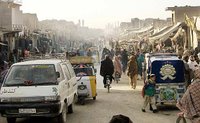Afghanistan Again
 As we approach the five year anniversary of the toppling of the Taliban regime, the situation in Afghanistan looks increasingly problematic.
As we approach the five year anniversary of the toppling of the Taliban regime, the situation in Afghanistan looks increasingly problematic.NATO has just called for 1 000 more troops in order to contain the rising tide of violence in the South of the country, but it looks rather unlikely that these forces will be forthcoming very fast.
At the hearth of the failure is the failure to attack and to limit the rapidly increasing drug production in the country, and in particular in these southern provinces.
In a report to be issued in full shortly, the United Nations Office of Drugs and Crime in Vienna is painting a picture of a situation rapidly escalating completely out of control.
Drug production is up nearly 60% this year, with Afghanistan now completely dominating the global opium markets.
According to UNDOC, production is the troubled Helmad province, where British forces are now having a hard time, increased by more than 160%.
And it says that "the southern part of Afghanistan was displaying the ominous hallmarks of incipient collapse, with large-scale drug cultivation and trafficking, insurgency and terrorism, crime and corruption."
There seems to bew little prospect in fighting this, and reversing the disturbing trends, without a fairly long-term combined military, political and economic effort.
Five years after the toppling of the Taliban, that's not too comfortable a conclusion. And one must question whether either the willigness or the resources are really there among, effectively, the NATO governments.
But if even worse should be avoided there isn't really any alternative.


<< Home